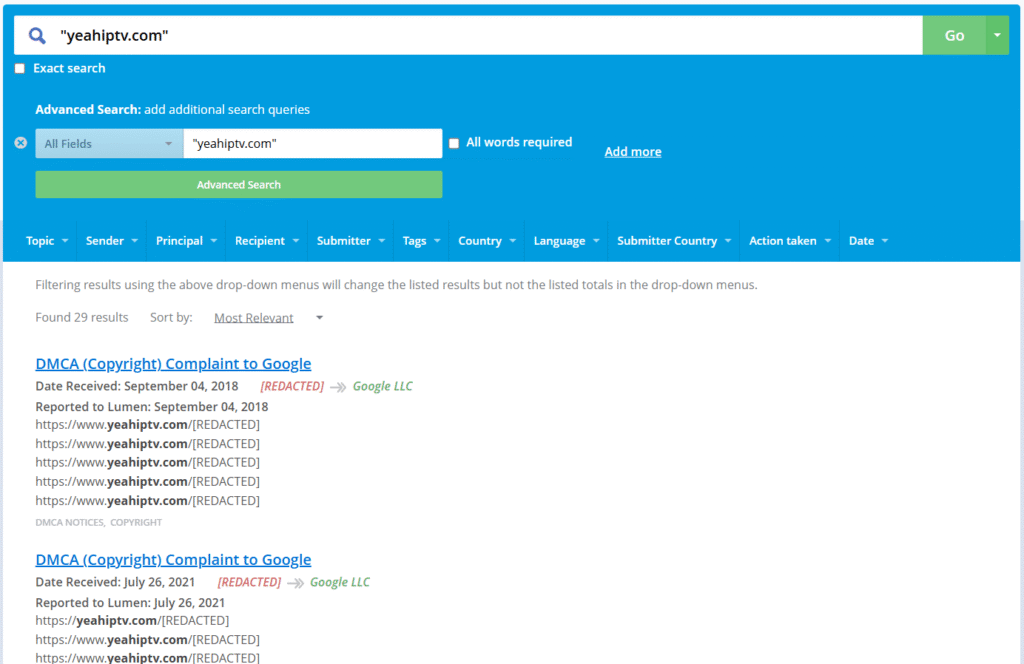This is the official Yeah IPTV site: yeahiptv.io. All other sites are scams. Click here to verify and stay safe.

The IPTV market has grown quickly in recent years. With thousands of people searching every day for affordable and reliable streaming options, IPTV has become a popular choice. However, this growing demand has also created opportunities for scammers who set up fake IPTV websites to mislead customers.
At YeahIPTV.io, we want to make it very clear:
YeahIPTV.io is the one and only official provider of Yeah IPTV services.
Any other website using our name, logo, or brand identity is not legitimate and should be avoided. The most active scam website right now is yeahiptv.com, and many unsuspecting customers have already lost money by trusting it.
Customers often ask how they can know which site is real. The answer is simple:
YeahIPTV.io is the official and trusted source. It offers professional IPTV service with real customer support.
yeahiptv.com is a fraudulent website pretending to be us. It has no relation to our company and has already been reported by multiple organizations for illegal activity.
Scammers often operate by copying the name of a successful brand to trick new customers. This is exactly what yeahiptv.com is doing. Here are the main reasons this site is a scam:
The website tries to look like the official Yeah IPTV service by copying the name. This confuses buyers who think they are dealing with the real provider.
yeahiptv.com only accepts cryptocurrency payments such as Bitcoin. This is a common scam tactic because crypto transactions are irreversible. Once you send money, there is no way to request a refund.
Legitimate IPTV providers usually have some form of refund or trial policy. yeahiptv.com offers no protection. If you do not receive the service, your money is simply gone.
Many customers report that after paying, they either receive nothing or receive unstable connections that stop working after a short time. There is no customer support to resolve the issue.
yeahiptv.com is already facing serious copyright complaints and legal issues from large organizations around the world. This proves the site is not only a scam but also illegal.
One of the strongest warnings against yeahiptv.com is the number of legal complaints filed against it. These complaints are recorded in public databases such as the Lumen Database, which tracks copyright notices and removal requests.
Some of the organizations that have taken legal action against yeahiptv.com include:
Liga Nacional de Fútbol Profesional
Rivendell on behalf of Groupe Canal+
LeakID on behalf of Premier League (EPL)
Sky Italia S.r.l.
Canal+ International
ALPA
NOS Comunicações SA
These are some of the biggest names in sports and media broadcasting. If a website is being targeted by this many international organizations, it is clear evidence that the site is operating illegally and should not be trusted.
To verify this for yourself, you can view the official records at the Lumen Database here:
https://lumendatabase.org/notices/search?page=2&sort_by=&term=%22yeahiptv.com%22
Fake IPTV providers like yeahiptv.com often use the same tricks to take advantage of buyers:
Attractive prices that seem too good to be true.
Copying brand names of legitimate IPTV companies.
Fake testimonials or reviews to build false trust.
No contact details or support team to help customers.
Cryptocurrency-only payments to avoid chargebacks and refunds.
By understanding these tactics, customers can learn how to recognize scams before losing money.
If you are new to IPTV or considering a subscription, follow these simple steps to protect yourself:
Check the official domain name
Always make sure you are visiting the correct website. The real Yeah IPTV service is only available at YeahIPTV.io.
Look for customer support options
Legitimate providers always have clear contact information and support channels. Scam sites often provide little or no way to reach them.
Avoid crypto-only payments
A trusted IPTV provider will usually accept multiple forms of payment. If a site only accepts Bitcoin, it is a red flag.
Search for legal complaints
Websites like the Lumen Database allow you to check if a provider has been flagged for copyright violations. This is a good way to spot fake services.
Read reviews carefully
Real reviews come from verified sources. Be cautious of websites that only show overly positive feedback without proof.
YeahIPTV.io has built its reputation on being a reliable and professional IPTV provider. Here is why customers choose us:
Official provider – We are the only real Yeah IPTV service.
Stable and high-quality streams – Access to thousands of channels with consistent performance.
Transparent policies – We provide clear information about services, payments, and support.
Customer support – Real agents available to help with setup or technical issues.
Secure payments – Multiple payment options that protect the customer.
Unlike scam sites, we are here for the long term and are focused on delivering a trusted service.
| Feature | YeahIPTV.io (Official) | yeahiptv.com (Scam) |
|---|---|---|
| Official provider | Yes | No |
| Customer support | Available | None or fake |
| Payment methods | Multiple, secure | Cryptocurrency only |
| Refunds | Available under policy | None |
| Legal status | Legitimate | Facing legal actions |
| Service quality | Reliable | Unstable or fake |
The IPTV market is filled with both genuine providers and dangerous scams. The most important step for customers is to identify the real services from the fake ones.
YeahIPTV.io is the only official Yeah IPTV provider.
The site yeahiptv.com is not connected to us. It is a scam, it misuses our name, and it has been repeatedly flagged for illegal activities by global organizations.
To stay safe and enjoy a reliable IPTV experience, always purchase from the official site: YeahIPTV.io.
Avoid scam websites like yeahiptv.com and protect your money, your privacy, and your viewing experience.
©2026, Yeah IPTV. All Rights Reserved